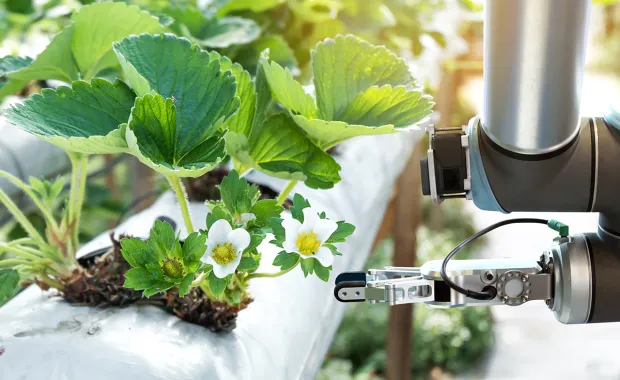Why technology has a pivotal role to play in a sustainable future
As citizens of Earth, we’re facing a “rapidly closing window of opportunity to secure a liveable and sustainable future for all”. IPCC analysis shows it’s “To limit global warming to 1.5°C, greenhouse gas emissions must peak before 2025 at the latest and decline 43% by 2030”, so global bodies, governments, industries and organisations need to work together fast to achieve a global transition to low-carbon economies. Technology is heralded as transformative force – but it must be deployed strategically to reach its greatest sustainability potential.
Balancing technology’s benefit with its harm
Our mission is to help our clients optimise their choice of transformative technologies and we’re committed to realising technology’s potential to reduce global emissions by up to 20%. We do this by leading, encouraging and facilitating others to join us in improving the health of our planet, and we believe a significant part of this lies in creating technology that can both advance digitalisation and mitigate technology’s own environmental impacts. For example, we can’t ignore the fact that data centres, a critical foundation of digitalisation, produce 1% of the world’s emissions and account for 3% of its electricity demand - with total global emissions estimated to rise to 14% by 2040. To help tackle this, our digital twin initiatives map individual data centres through sensors and provide actionable AI-driven insights on energy use and automated processes to ensure optimal operations.
We must collaborate to drive sustainable technology further, faster
While initiatives like this are driving significant progress in our journey to a sustainable world, achieving the international community’s ambitious environmental goals requires collaboration on a global scale. However transformative an innovation, it can’t achieve its full sustainability potential without effective joint working between industry, academia, government and society. It’s crucial we put an end to transformative projects getting stuck in silos or being subjected to prolonged lifecycles between concept and full industrialisation. Instead, we must make it possible for industry to access the cutting-edge frameworks, methodologies and models being developed across academia, and we must support academic institutions to scale-up innovative solutions to make these practical and commercially viable.
To break down these barriers to accelerated technology rollouts, in 2022 CGI launched the Sustainability Exploration and Environmental Data Science (SEEDS) programme, which unites universities, CGI and the United Nations (UN), to create a space where we can leverage our experience in getting Proof of Concept projects onto the market quickly, so they can contribute meaningfully to climate resilience. SEEDS is already making a positive contribution to areas like climate adaptation, natural capital accounting, chemical and waste reduction, and supply chain sustainability – and its potential is set to expand significantly when it’s incorporated into our latest initiative, The Planet Platform.
Sustainability’s single source of truth
The Planet Platform will draw datasets from the SEEDS programme, Google’s Earth Engine, and the UN’s global projects database to create a single source of truth. Countries can then use the platform to identify the sustainability challenges in each region and industry, what interventions the UN is running to tackle these challenges, and how progress stacks up against specific criteria.
Encompassing nature, biodiversity, emission reduction, climate justice and wider environmental, social and corporate governance (ESG) goals - like the role of developing communities in supply chains - the platform represents the most comprehensive insight into global sustainability. And by incorporating machine learning, AI, digital twins, and other technologies, this resource will also provide critical insights, forecasts and remediation models that member states and other stakeholders can use to develop more effective climate interventions.
COP28: a turning point
The Planet Platform has the potential to revolutionise and accelerate effective global sustainability endeavours, and COP28 is a pivotal moment in its development. Alongside the UN, we’re using this event to raise the platform’s profile by signing a Memorandum of Understanding that will enable CGI to share its knowledge, experience, and expertise on sustainability and technology with the UN and wider global community. By leveraging technology and collaboration, we aim to accelerate global progress towards both our own and others’ ambitious sustainability goals.
To find out more about the specific technology solutions we’re developing collaboratively, and the innovations that are shaping our own net zero journey, find out more about CGI in ESG and Sustainability.






